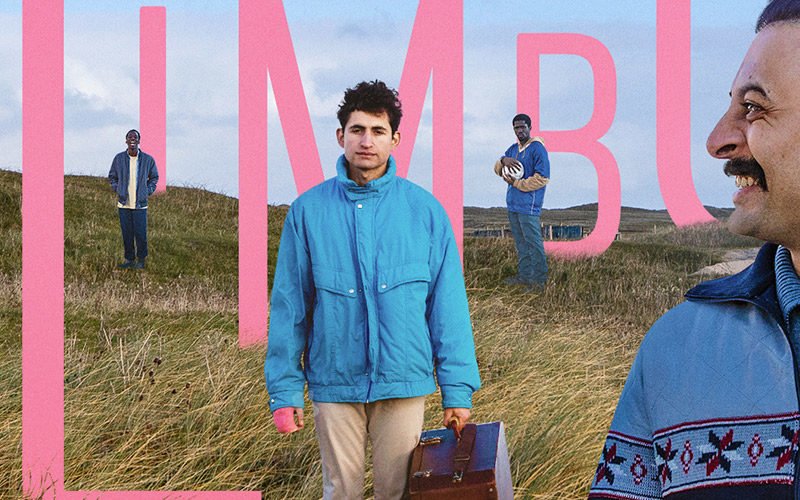
30 Apr Limbo Review
LIMBO
dir. Ben Sharrock, starring Amir El-Masry, Vikash Bhai, Oly Orebiyi, Kais Nashef, et al
Limbo centers on four asylum seekers who are staying on a remote island in Scotland, and taking cultural awareness classes, while awaiting the processing of their refugee claims.
Omar, a Syrian man who’s fled his country and is seeking asylum in Britain awaits his acceptance in Limbo, an emotional journey of self discovery and self acceptance. A comedy/drama written and directed by Ben Sharrock, Limbo is equal parts saddening, joyful, and tender. As Omar and his roommate await word from the government, Omar is haunted by his decision to leave war-torn Syria and his parents in order to attempt to make a better life. Accompanying him on this journey is his oud, a musical instrument Omar is renown for playing back home, but doesn’t as much as strum throughout the film. This is in part due to the fact that Omar starts the movie with a broken hand, but once the cast comes off, the most he allows himself to do is occasionally tune it. Still, he carries his oud everywhere he goes, as if it’s his last attachment to his family back home and he dare not let it out of his sight.
Of the group of refugees, the two that receive the least amount of screen time are Wasef and Abedi, both refugees from Africa that are in Scotland under false pretenses. The dynamic between the two is brotherly, as they argue over the fates of Ross and Rachel in Friends and whether or not Wasef is good enough to make a football club in Europe. While not in the movie often, they bring a different sort of worldview, apart from the likes of Omar and his housemate Farhad. Their story brief and ultimately tragic, the pair of characters help to expand Omar’s small world and bring perspective to the fact that refugees can come from anywhere and be going anywhere.
As the film progresses, Omar’s estrangement becomes twofold: not only is he in an unfamiliar world with few resources but the nature of conversation between him and his parents at home also changes. At beginning his parents go from doubting his brother Nabil fighting in the war to eventually praising him. This creates the only real source of tension and conflict in the movie as Omar and his brother share opposing ideals on how to best handle the situation in Syria. Their eventual confrontation, the peak of Omar’s journey throughout the movie, is a quiet affair, accentuated by actor Kais Nashef as Nabil who commands the screen in the one scene he’s in.
At the front and center of this movie is Amir El-Masry, playing Omar, one of many transitioning immigrants parked on this fictional Scottish island. We see the landscape through Omar’s eyes as he navigates the other immigrants, the temptations of illegal work, and his own personal issues. The heart of Omar’s struggle is the decision of whether or not he made the right choice to leave. This issue is brought up time and time again on the phone calls with his parents, as well as their declining financial situation.. El-Masry plays the conflicted Omar wonderfully, fulling put his heart on his sleeve and making it easy for the audience to endear themselves to him. His gentle nature and calm demeanor makes Omar the perfect protagonist to take us on this journey. Likewise, Vikash Bhai as Omar’s housemate Farhad is delightfully quirky, providing the majority of the humor in the film. Farhad’s constant sweet optimism and earnestness to assist Omar with his music contrasts against Omar’s inner conflict, making a for a great odd coupling of friends. Farhad’s own motivations for leaving his country are more implicitly stated than Omar’s but still serve to give him depth and dimension and by the film’s end, viewers will be overjoyed at Farhad’s circumstances. El-Masry and Bhai carry the emotional heft of the dramedy, while Sidse Babett Knudsen and Kenneth Collard as the group’s peculiar cultural sensitivity teachers lead the rest of the eclectic, quirky cast.
Directed by Ben Sharrock, Limbo is minimalistic in its approach: sparse settings and wide open areas help create the feeling of reclusiveness felt by Omar as he struggles to adapt to his settings while he waits for his immigration papers. This low key approach is assisted greatly by cinematographer Nick Cooke and by the set design. Outside, a number of scenes are shot with plenty of visible open space behind the characters to show the expanse of this fictional Scottish island and how isolated they are from the rest of society. Even the closest telephone booth is nowhere in sight of the smattering of units they’re housed in. Inside those units, only the absolute barest appliances are found: no wall art, very little furniture, and few things of personal value are seen on the screen as way to remind the viewers that while they packed light to leave their country neither have they acquired anything new to start building a new life. Even the grocery store Omar visits on occasion contains almost completely empty shelves. The shot composition and set design help give life to a location that while populated is still shrouded in loneliness.
Overall, Limbo is an amazingly sweet story of a man lost between worlds and struggling to find his identity. Amir El-Masry and Vikash Bhai are stellar standouts in this somewhat ensemble film that manages to deftly balance the humor and a subject as serious immigration. Competently directed by Ben Sharrock, Limbo is a film that should be seen by many and unfortunately will be seen by far too few. At times funny and at different times heart wrenching, the film is an eye opening insight into the struggles of leaving one’s home country in search of a new one. You can (responsibly) see Limbo in theaters on April 30th.
Review by Darryl Mansel


No Comments